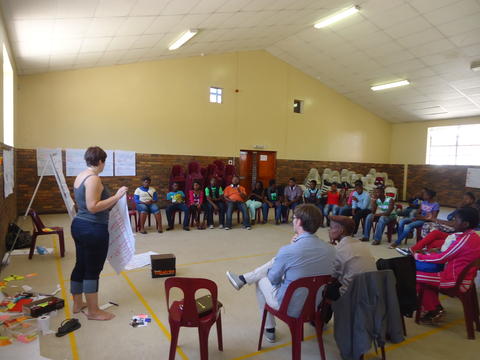

The weekend consisted of planning for 2013 as well as an election to choose the new branch committee as well as choosing the different heads of the different portfolios. Present were more than 30 learners from different grades and tutors and they all had a chance to discuss the decision making, planning and electing the branch committee.
The Main goal of our SPW was to elect a branch committee (in charge of roles and portfolios) and for new volunteers (grade12 from last year returning) to take ownership of programme and become part of the management team. It was also a great weekend for the leaner reps and tutors to get to know each other better.
On Saturday we discussed the year program and we also had a look back at what happened in 2012. The morning started off with an introduction and the group explaining what their expectations of the weekend will be, we then discussed what happened in 2012 and then we ended with looking at what IkamvaYouth is doing well, what challenges we are facing, what IkamvaYouth is offering learners and the community and what we can do to improve the programme. We had a lot of first time branch committee members, but the rest of the group made them all feel included and welcome.
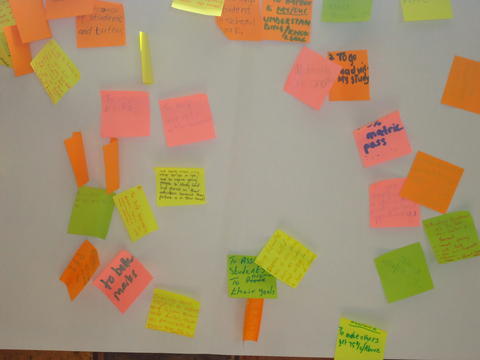
On Sunday the election took place and everyone had a chance to vote for the different nominees. The nomination and election process were very democratic and the nominees had to explain to the group why they were best suited for the different portfolios. The different portfolios were Tutoring, Volunteer Coordination, Career Guidance, Media, Image and Expression, Computer Literacy, Health and Life Skills and Alumni.
The different portfolio members also had to discuss their portfolios and present a plan of action for the group and will need to present this plan of action to all the Ikamvanites at Makhaza. They had to present their goals, when the goals should be reached and by whom. Emihle, a grade 8 learner and newly appointed portfolio member said that the weekend was a dream come true and that she enjoyed the interaction and discussions that took place and that she is really happy and proud for being chosen as part of the health and life skills portfolio.

Mandisi Gladile, a tutor says, “the weekend was really informative and made me realise the value IkamvaYouth adds not only to the learners but also the community and I feel really inspired for the things that we have planned for 2013.”
strategic_planning_week_2013.pdf
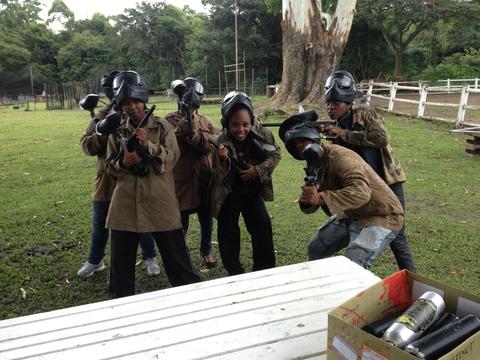

For some, the perfect staff team building/recharge day would be activities such as a relaxed lunch/picnic, or perhaps a spa session. For the KZN team, it was paintballing! What better way to let off some steam than shooting at your colleagues? And with only one male in the KZN team, it was pretty obvious who would leave the arena with the most bruises (bwaahaaahaaahaa!!!).
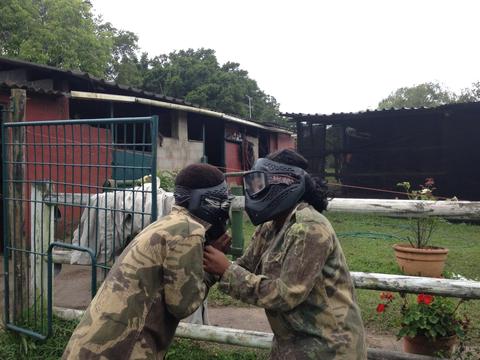
On the real though, we’re not a violent bunch. And the aim of the day was really just for us all to get together in a context completely different from what we’re used to. After all, that’s what IY is all about, stepping out of our comfort zone, taking over new territories, fighting battles, and coming out of them battered and bruised at times, but victorious in the end. This simulated battle was the perfect way to start the new year. For me, it reminded me that even when I have attacks coming from all sorts of angles, I have a team that’s got my back.
Lunch at a local shisanyama was the perfect ending to a fantastic day spent with an amazing group of people with one common goal: making a difference in the lives of the disadvantaged communities we work in. We had an opportunity to share a few laughs, get to know each other, more so our newest team member, Nelisa Luhabe, outside of work. With our tummies fed, we’re all geared up for action, and anything the new year has in store for us. Watch out 2013, the Avengers are here!!!
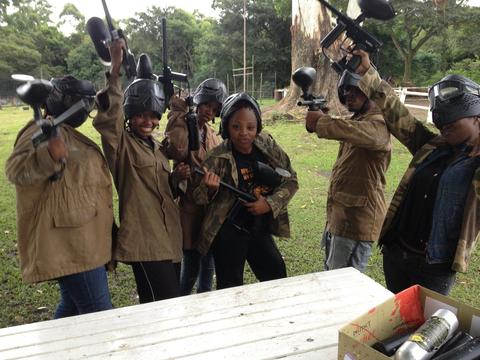
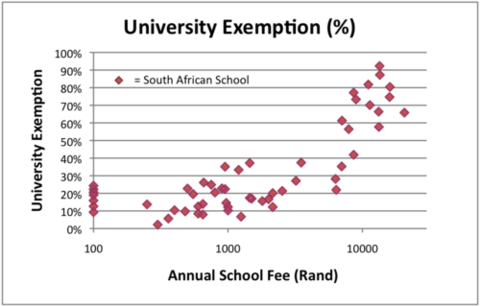
Just over a year ago I was approached by Andrew Einhorn, a UCT grad student, who was interested in implementing an online maths program at Makhaza. All he needed was access to the lab, access to a class and a tutor. A year down the line not only he has completely revamped two of our branches labs in Makhaza and Nyanga, established a formal Khan Academy program in these branches (as well as other locations in Cape Town and rural Eastern Cape), but has produced results at very low costs, and is piloting in schools for 2013.
His passion for creating high impact and stimulating learning environments in township and rural locations often only privy to the wealthy few has seen him start Numeric, an NGO interested in finding ways to bring Khan Academy to South Africa and make it a useful resource to both teachers and learners. He presented an inspiring TEDxUCT talk last year outlining the background, as well as the impact and results Numeric has had. He also posted the following blog on the Khan Academy website:
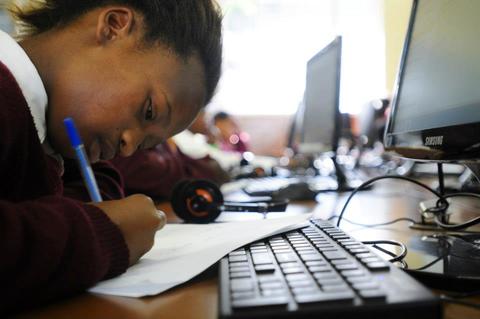
A little over 15 months ago, we started an experiment. We wanted to know if Khan Academy was viable in township (slum) areas in South Africa and if so, what type of impact it might have on numeracy. Numeracy in South Africa is astonishingly weak, with just 2% of Grade 9s scoring over 50% on the annual national assessments in 2012.
And so we set out to see if Khan Academy might be used as a catalyst for change. But before I expound on the results of this experiment, I ought perhaps give a little more background on the environments we’re working in.
Townships in South Africa are not unlike the favelas of Brazil or the slums bordering Delhi and Calcutta in India. They are urban areas that were, until the end of Apartheid in 1994, reserved for non-whites, but have now become residential hubs for the urbanizing masses. They are typically built on the periphery of cities and tend to be characterized by high population density, poverty and unemployment. Picture a ramshackle of makeshift houses constructed out of corrugated iron, wood scraps and cardboard, jigsawed together into a gigantic maze 5 miles wide and 10 miles across. At the risk of generalising grossly, that’s more or less the picture I want you to have in mind as you read this article.
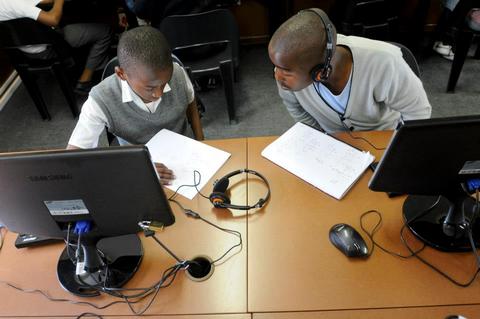
Now, townships in South Africa get a bad rap. They are viewed as ‘dangerous’ places and it is considered unwise to visit them unless you know someone there, or visit them as part of a ‘township tour’. Yet while crime rates in these areas are often high, the reputation does not do justice to the vibrant and persevering people who inhabit them. In particular, townships are YOUNG! On any given day, around two o’clock in the afternoon, the streets flood with uniformed, backpack-toting children on their way home from school. And despite having barely two pennies to rub together, they are meticulously dressed – shiny black shoes, starched white collars – and have aspirations to match. Most of the children in South Africa live in some form of township, which means that children growing up in these environments constitute the better part of the future of our country.
And yet it is supremely difficult to convince our best teachers to go and work in these areas. They are offered good jobs in well-resourced schools most often located in the wealthy suburbs of the cities. Principals at these schools compete fiercely for their skills. And this is as it should be. But it also entrenches the educational bias whereby a child’s access to quality education is directly proportional to the wealth of their family (see chart below).
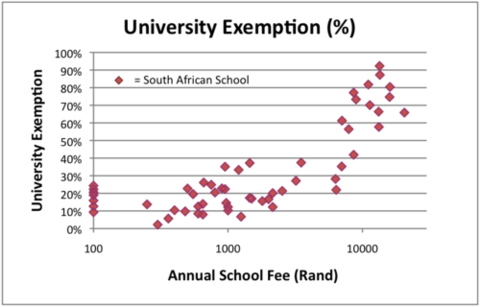
* University exemption rate refers to the percentage of learners who attain the academic marks in their final year of school that are necessary to gain access to South African universities.
So Numeric’s experiment was to see whether we could use Khan Academy, in conjunction with a slightly less skilled (and often unqualified) math coach, to create the high impact and stimulating learning environments enjoyed by kids living in wealthier suburbs.
The opportunity provided by Khan Academy premised on the following: Videos do not argue about where they are played; they are unaffected by crime and environment. Appropriately licensed, they do not cost anything. They do not grow weary, skip class, or grow jaded. Instead, they convey their message enthusiastically, faithfully, clearly – time and time again. A child may watch just as many videos as he/she has appetite for, and need never feel limited by the dragging on of a boring class or an inept teacher. For many children in South Africa, a Khan Academy video will be their first exposure to what we might term ‘world class instruction’. When complemented by the exercises on the Knowledge Map, Khan Academy becomes a powerful tool for turning the tide on numeracy in South Africa.
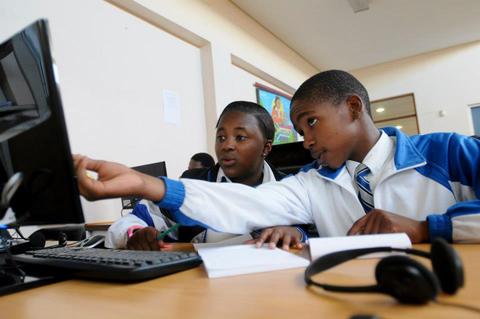
So what were the results of the experiment? Well, it’s probably too early to draw any major conclusions, but we do have a few figures we’d like to share. We currently run 7 Khan Academy classes across 3 different hubs in the Eastern and Western Cape provinces of South Africa. The first pilot group of 20 Grade 9s has just completed its first twelve months of Khan Academy and their numbers are as follows:
* Total Khan Academy hours delivered: 2220
* Total Problems Solved: 27,988
* Total Problems per learner: 1399
* Total Khan Modules Complete: 1232
* Average Modules per learner: 62
Bearing in mind this is an afterschool programme, these are 27,988 math problems that would not otherwise have been attempted. The 62 modules completed by the average learner constitute 62 gaps that those learners have filled. But it’s more about just the numbers; it’s about creating excitement and enthusiasm around learning. This is hard to convey in words, but perhaps a picture will suffice.
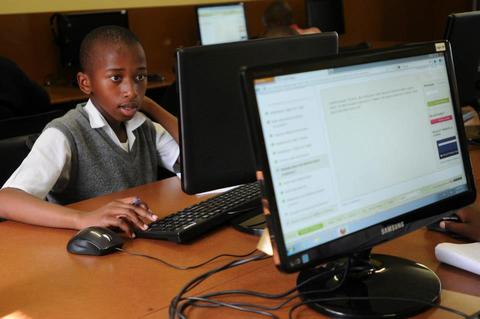
As we always say to our coaches, the tragedy in South Africa is not so much that kids don’t want to learn. It’s that some kids DO want to learn, but can’t. Khan Academy provides us one way to give these kids a world-class education without having to magically replenish our nation’s supply of teachers. And who knows, perhaps one day these kids will become the inspirational and talented teachers we have waited for for so long!
—-
Andrew Einhorn is the founder and current CEO of Numeric.org. His TEDx talk on Numeric.org and Khan Academy is available here.
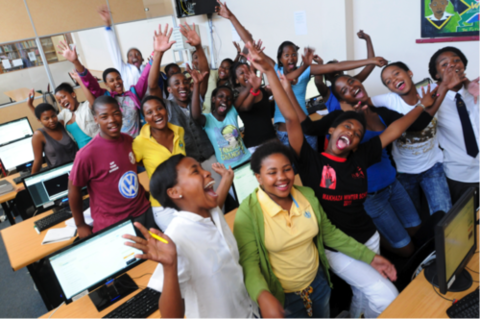

Just over a year ago I was approached by Andrew Einhorn, a UCT grad student, who was interested in implementing an online maths program at Makhaza. All he needed was access to the lab, access to a class and a tutor. A year down the line not only he has completely revamped two of our branches labs in Makhaza and Nyanga, established a formal Khan Academy program in these branches (as well as other locations in Cape Town and rural Eastern Cape), but has produced results at very low costs, and is piloting in schools for 2013.
His passion for creating high impact and stimulating learning environments in township and rural locations often only privy to the wealthy few has seen him start Numeric, an NGO interested in finding ways to bring Khan Academy to South Africa and make it a useful resource to both teachers and learners. He presented an inspiring TEDxUCT talk last year outlining the background, as well as the impact and results Numeric has had. He also posted the following blog on the Khan Academy website:

A little over 15 months ago, we started an experiment. We wanted to know if Khan Academy was viable in township (slum) areas in South Africa and if so, what type of impact it might have on numeracy. Numeracy in South Africa is astonishingly weak, with just 2% of Grade 9s scoring over 50% on the annual national assessments in 2012.
And so we set out to see if Khan Academy might be used as a catalyst for change. But before I expound on the results of this experiment, I ought perhaps give a little more background on the environments we’re working in.
Townships in South Africa are not unlike the favelas of Brazil or the slums bordering Delhi and Calcutta in India. They are urban areas that were, until the end of Apartheid in 1994, reserved for non-whites, but have now become residential hubs for the urbanizing masses. They are typically built on the periphery of cities and tend to be characterized by high population density, poverty and unemployment. Picture a ramshackle of makeshift houses constructed out of corrugated iron, wood scraps and cardboard, jigsawed together into a gigantic maze 5 miles wide and 10 miles across. At the risk of generalising grossly, that’s more or less the picture I want you to have in mind as you read this article.

Now, townships in South Africa get a bad rap. They are viewed as ‘dangerous’ places and it is considered unwise to visit them unless you know someone there, or visit them as part of a ‘township tour’. Yet while crime rates in these areas are often high, the reputation does not do justice to the vibrant and persevering people who inhabit them. In particular, townships are YOUNG! On any given day, around two o’clock in the afternoon, the streets flood with uniformed, backpack-toting children on their way home from school. And despite having barely two pennies to rub together, they are meticulously dressed – shiny black shoes, starched white collars – and have aspirations to match. Most of the children in South Africa live in some form of township, which means that children growing up in these environments constitute the better part of the future of our country.
And yet it is supremely difficult to convince our best teachers to go and work in these areas. They are offered good jobs in well-resourced schools most often located in the wealthy suburbs of the cities. Principals at these schools compete fiercely for their skills. And this is as it should be. But it also entrenches the educational bias whereby a child’s access to quality education is directly proportional to the wealth of their family (see chart below).

* University exemption rate refers to the percentage of learners who attain the academic marks in their final year of school that are necessary to gain access to South African universities.
So Numeric’s experiment was to see whether we could use Khan Academy, in conjunction with a slightly less skilled (and often unqualified) math coach, to create the high impact and stimulating learning environments enjoyed by kids living in wealthier suburbs.
The opportunity provided by Khan Academy premised on the following: Videos do not argue about where they are played; they are unaffected by crime and environment. Appropriately licensed, they do not cost anything. They do not grow weary, skip class, or grow jaded. Instead, they convey their message enthusiastically, faithfully, clearly – time and time again. A child may watch just as many videos as he/she has appetite for, and need never feel limited by the dragging on of a boring class or an inept teacher. For many children in South Africa, a Khan Academy video will be their first exposure to what we might term ‘world class instruction’. When complemented by the exercises on the Knowledge Map, Khan Academy becomes a powerful tool for turning the tide on numeracy in South Africa.

So what were the results of the experiment? Well, it’s probably too early to draw any major conclusions, but we do have a few figures we’d like to share. We currently run 7 Khan Academy classes across 3 different hubs in the Eastern and Western Cape provinces of South Africa. The first pilot group of 20 Grade 9s has just completed its first twelve months of Khan Academy and their numbers are as follows:
* Total Khan Academy hours delivered: 2220
* Total Problems Solved: 27,988
* Total Problems per learner: 1399
* Total Khan Modules Complete: 1232
* Average Modules per learner: 62
Bearing in mind this is an afterschool programme, these are 27,988 math problems that would not otherwise have been attempted. The 62 modules completed by the average learner constitute 62 gaps that those learners have filled. But it’s more about just the numbers; it’s about creating excitement and enthusiasm around learning. This is hard to convey in words, but perhaps a picture will suffice.

As we always say to our coaches, the tragedy in South Africa is not so much that kids don’t want to learn. It’s that some kids DO want to learn, but can’t. Khan Academy provides us one way to give these kids a world-class education without having to magically replenish our nation’s supply of teachers. And who knows, perhaps one day these kids will become the inspirational and talented teachers we have waited for for so long!
—-
Andrew Einhorn is the founder and current CEO of Numeric.org. His TEDx talk on Numeric.org and Khan Academy is available here.

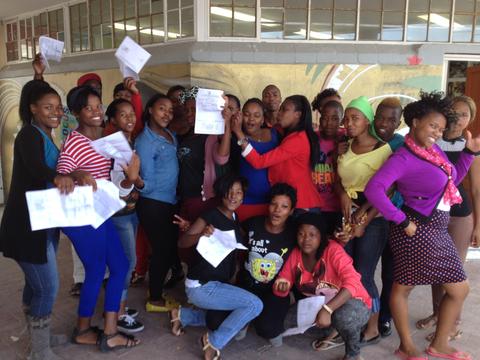
Right now, learners all across the country are either celebrating or commiserating after receiving their matric results. And the national numbers seem to suggest that whether matriculants are partying or weeping has a lot to do with their level of economic privilege and the resources of their schools.
But in townships around South Africa, a very special group of matriculants with a whole lot of reasons to celebrate are bucking that trend, and proving that the seemingly impossible is possible with hard work and a little help from one’s friends.
These young people are the ikamvanites, and this week they overcame all the challenges of their circumstances to achieve a national pass rate of 89% and an incredible 100% pass rate in both Gauteng and KwaZulu-Natal – results far more privileged learners would be proud of!
Those aren’t just 30% passes either: 87% of ikamvanites achieved the Bachelor or Diploma passes they need to take their education to the next level and access the kinds of opportunities they need to fulfil their dreams of supporting and uplifting their families. Most remarkable of all, these learners aren’t waiting to uplift their communities, and 72% have already become volunteer tutors for the next cohorts of learners; ensuring the exponential replication of the IkamvaYouth model and reach.
Mamphela Ramphele reports that she’s thrilled to witness IkamvaYouth’s incredible growth and enormous impact. “IkamvaYouth saves learners from despair and grinding poverty and most importantly gives them hope… the organisaton’s sustainable model, extra-ordinary commitment and exceptional results inspire our nation.”
Talent Chinogureyi, an ikamvanite in Chesterville, KZN, enthused, “I want to go to university and study further so that when I graduate I can be the one to eradicate poverty at home.” She achieved a Bachelor pass and a distinction for Accounting and has been accepted to study a B Com at prestigious private Johannesburg institution St Augustine College.
At the Masiphumelele branch of IkamvaYouth in the Western Cape, one learner overcame even more hardship than most. “The majority of people tend to think that once you have fallen pregnant, it is the end of the world. I have proved to them that there is still hope. Through all the hardships, I made it. I got a Bachelor pass… I say B for my Baby,” said Neliswa Mnaheni, who hopes to study Marketing next year.
While this has been a time of celebration for most ikamvanites, it has been very challenging for some. Thankfully, everyone that did not pass is eligible for supplementary exams, and IkamvaYouth will be supporting these learners to ensure that they are well-prepared to excel. Others were traumatised by the ongoing illegal practice of withholding results due to unpaid school fees or outstanding textbooks. While IkamvaYouth was able to step in and support families with school fee contributions thanks to its donors, there are thousands of learners across the country who do not have access to this kind of support. “The no-fees-no-report practice is unjust, humiliating and illegal and needs to end”, says Joy Olivier, director of IkamvaYouth. “Our learners need these results in order to realise their dreams and schools need alternative avenues to access much-needed funds”.
IkamvaYouth’s work with the class of 2012 is also far from over. While many of those who passed have already been accepted by the country’s top universities, there is still work to be done to ensure that none of the class of 2012 become unemployed. The next step is ensuring that all these learners access tertiary education, training, internships, learnerships or employment. “IkamvaYouth will continue to support all our 2012 matrics as they access quality post-school opportunities and become tutors; enabling the following years’ learners to do the same,” says Zamo Shongwe, IkamvaYouth’s national coordinator.
IkamvaYouth invites everyone to get involved. There are branches in the Western Cape (Khayelitsha, Nyanga and Masiphumelele); KZN (Chesterville and Umlazi) and Gauteng (Ivory Park, and Ebony Park), North West (a new branch opening in Potchefstroom) and the Eastern Cape (a new branch opening in Grahamstown). IkamvaYouth has maintained a matric pass rate of between 85 and 100% each year since 2005, and true credit for these results must go to the learners, volunteers, the branch teams, partner organisations and donors.


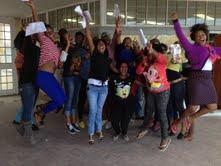

On Thursday 3 January the grade 12 results were released by the Western Cape Education Department and Makhaza achieved an 82% pass rate, up from 55% in 2011. This was testament to the hard work done by the learners and the tutors at the branch.
10 of the learners achieved Bachelor passes with 1 level 7 (83%) pass in Economics, 2 level 6 (71%) passes in Mathematics, 1 level 6 (71%) pass in Mathematical Literacy, 1 level 6 (76%) pass in Life Sciences and 1 level 6 (74%) pass in Accounting. 8 learners achieved Diploma passes and 5 learners Higher Certificate passes. The 5 learners that did not pass the exams all qualified for supplementary exams and we hope that Makhaza will have a 100% pass come the end of the supplementary exams.

Yibanathi Phaphu, one of the top achievers said that he still couldn’t believe that he passed so well and that he is waiting for the feeling to sink in. He also said that he is looking forward to starting university where he will be doing a B. Comm degree, as he would like to be a Chartered Accountant, at the University of the Western Cape and didn’t expect to get Bs but that he just worked very hard. Sisabelo Pama another top achiever was really excited and couldn’t stop smiling and indicated that she will be pursuing a qualification in Electrical Engineering at Cape Peninsula University of Technology. Nomasomi Gugushe scored 83% for Economics and is planning to study construction management at CPUT. She said “I believe without IkamvaYouth I wouldn’t have passed my grade 12 like I did”.
The day was also marked by a bit of sadness, as we would have loved to see all the matriculants pass first time around, but mostly with joy as learners, parents, staff and tutors all celebrated the successes. The results also bear testament of what the learners are capable of when they really want to do something. In 2011 Makhaza had a lot of difficulties, with the office being petrol-bombed during service delivery protests and the teacher strikes that interupted the school year, but the matriculants of 2012 built on these difficulties and showed that they can achieve and do well even in the face of adversity.




















 Lloyd Lungu
Lloyd Lungu